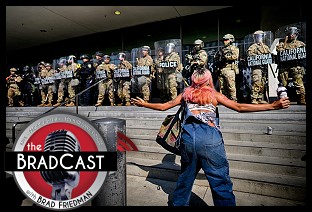READER COMMENTS ON
"CONNECTICUT ABOLISHES DEATH PENALTY"
(4 Responses so far...)
COMMENT #1 [Permalink]
...
Ernest A. Canning
said on 4/25/2012 @ 1:38 pm PT...
Here in California, come November, voters will have the opportunity to do one better than Connecticut.
The California End the Death Penalty Act, if it passes, would reduce all existing death sentences to "life in prison without the possibility of parole."
COMMENT #2 [Permalink]
...
Parke Bostrom
said on 4/25/2012 @ 5:10 pm PT...
"Welcome to the civilized world"?? "Welcome"??
Brad, I thought you lived in (uncivilized) California. Perhaps you should be saying goodbye to Connecticut, not hello?
COMMENT #3 [Permalink]
...
Brad Friedman
said on 4/25/2012 @ 8:17 pm PT...
Parke Bostom @ 2:
Ha! I think you've got me there! 
In truth, however, while I didn't have time to delve into that point while quickly posting the above, as I was prepping for my KPKF show today, I did speak to that very issue at the very top of the show, which is now posted here.
(That's followed on the show by my interview with Joyce Block, the 90-year old PA woman who was denied her "free" ID under the new GOP voter suppression law out there.)
COMMENT #4 [Permalink]
...
MsKitty
said on 5/14/2012 @ 6:15 pm PT...
A step in the right direction, one state at a time until all states recognize that capital punishment is a violation of the 8th amendment;
"The general principles the United States Supreme Court relied on to decide whether or not a particular punishment was cruel and unusual were determined by Justice William Brennan.[3] In Furman v. Georgia, 408 U.S. 238 (1972), Justice Brennan wrote, "There are, then, four principles by which we may determine whether a particular punishment is 'cruel and unusual'."
The "essential predicate" is "that a punishment must not by its severity be degrading to human dignity," especially torture.
"A severe punishment that is obviously inflicted in wholly arbitrary fashion." (Many prisoners have been denied access to DNA evidence which could confirm or exonerate from guilt, many prisoners of particular ethnic groups seem to be given more severe punishments for the same crimes)
"A severe punishment that is clearly and totally rejected throughout society." (we can only hope)
"A severe punishment that is patently unnecessary."
Continuing, he wrote that he expected that no state would pass a law obviously violating any one of these principles, so court decisions regarding the Eighth Amendment would involve a "cumulative" analysis of the implication of each of the four principles. In this way the United States Supreme Court "set the standard that a punishment would be cruel and unusual [,if] it was too severe for the crime, [if] it was arbitrary, if it offended society's sense of justice, or if it was not more effective than a less severe penalty."[4] (Note the last statement - Has anyone ever proved that capital punishment statistically deterred or reduced capital crimes? - I have not seen that study if there is one.)
 Welcome to the civilized world, Connecticut! And thank you for putting an end to the biggest Big Government tyranny there can be.
Welcome to the civilized world, Connecticut! And thank you for putting an end to the biggest Big Government tyranny there can be.

 Sunday 'Total Obliteration' Toons
Sunday 'Total Obliteration' Toons Thank You For Your Attention to This Matter:
Thank You For Your Attention to This Matter: 'Green News Report' 6/26/25
'Green News Report' 6/26/25
 Mamdani Primary 'Win' Augurs New Generation of Progressives Rising: 'BradCast' 6/25/25
Mamdani Primary 'Win' Augurs New Generation of Progressives Rising: 'BradCast' 6/25/25 U.S. Authoritarianism Under-way (But We're Still Here to Fight It): 'BradCast' 6/24/25
U.S. Authoritarianism Under-way (But We're Still Here to Fight It): 'BradCast' 6/24/25 'Green News Report' 6/24/25
'Green News Report' 6/24/25 'Anti-War' Trump Attacks a Mid-East Nation on False Claims About WMD: 'BradCast' 6/23/25
'Anti-War' Trump Attacks a Mid-East Nation on False Claims About WMD: 'BradCast' 6/23/25  Sunday 'Peacemaker' Toons
Sunday 'Peacemaker' Toons Senate Health Care Cuts 'More Extreme' Than House Version: 'BradCast' 6/19/25
Senate Health Care Cuts 'More Extreme' Than House Version: 'BradCast' 6/19/25 'Green News Report' 6/19/25
'Green News Report' 6/19/25 What 'Anti-War President'? MAGA Civil War Over Trump, Iran: 'BradCast' 6/18/25
What 'Anti-War President'? MAGA Civil War Over Trump, Iran: 'BradCast' 6/18/25 Trump Calls for 'Remigration', a Codeword for 'Ethnic Cleansing': 'BradCast' 6/17/25
Trump Calls for 'Remigration', a Codeword for 'Ethnic Cleansing': 'BradCast' 6/17/25 'Green News Report' 6/17/25
'Green News Report' 6/17/25 Last Weekend Today: 'BradCast' 6/16/25
Last Weekend Today: 'BradCast' 6/16/25 Sunday 'Despot Times, Despot Measures' Toons
Sunday 'Despot Times, Despot Measures' Toons Then They Came for the U.S. Senators: 'BradCast' 6/12/25
Then They Came for the U.S. Senators: 'BradCast' 6/12/25 'Green News Report' 6/12/25
'Green News Report' 6/12/25 Lawless Trump Warms Up for Insurrection Act: 'BradCast' 6/11/25
Lawless Trump Warms Up for Insurrection Act: 'BradCast' 6/11/25 Trump Inciting Violence, State of Fear in L.A., Elsewhere: 'BradCast' 6/10/25
Trump Inciting Violence, State of Fear in L.A., Elsewhere: 'BradCast' 6/10/25 Nevermind Elon and Epstein Files, Trump Declares L.A. 'Riots'!: 'BradCast' 6/9/25
Nevermind Elon and Epstein Files, Trump Declares L.A. 'Riots'!: 'BradCast' 6/9/25 'Jesus Weeps' at Trump's
'Jesus Weeps' at Trump's 300k 'Preventable' Deaths Since Trump USAID Shutdown: 'BradCast' 6/4/25
300k 'Preventable' Deaths Since Trump USAID Shutdown: 'BradCast' 6/4/25 Storm Warnings: 'BradCast' 6/3/25
Storm Warnings: 'BradCast' 6/3/25 SCOTUS Ignores Own Precedents In Recent 'Emergency' Rulings: 'BradCast' 6/2/25
SCOTUS Ignores Own Precedents In Recent 'Emergency' Rulings: 'BradCast' 6/2/25 'A World of Tyrants, Bribes, and Influence': 'BradCast' 5/22/25
'A World of Tyrants, Bribes, and Influence': 'BradCast' 5/22/25
 VA GOP VOTER REG FRAUDSTER OFF HOOK
VA GOP VOTER REG FRAUDSTER OFF HOOK Criminal GOP Voter Registration Fraud Probe Expanding in VA
Criminal GOP Voter Registration Fraud Probe Expanding in VA DOJ PROBE SOUGHT AFTER VA ARREST
DOJ PROBE SOUGHT AFTER VA ARREST Arrest in VA: GOP Voter Reg Scandal Widens
Arrest in VA: GOP Voter Reg Scandal Widens ALL TOGETHER: ROVE, SPROUL, KOCHS, RNC
ALL TOGETHER: ROVE, SPROUL, KOCHS, RNC LATimes: RNC's 'Fired' Sproul Working for Repubs in 'as Many as 30 States'
LATimes: RNC's 'Fired' Sproul Working for Repubs in 'as Many as 30 States' 'Fired' Sproul Group 'Cloned', Still Working for Republicans in At Least 10 States
'Fired' Sproul Group 'Cloned', Still Working for Republicans in At Least 10 States FINALLY: FOX ON GOP REG FRAUD SCANDAL
FINALLY: FOX ON GOP REG FRAUD SCANDAL COLORADO FOLLOWS FLORIDA WITH GOP CRIMINAL INVESTIGATION
COLORADO FOLLOWS FLORIDA WITH GOP CRIMINAL INVESTIGATION CRIMINAL PROBE LAUNCHED INTO GOP VOTER REGISTRATION FRAUD SCANDAL IN FL
CRIMINAL PROBE LAUNCHED INTO GOP VOTER REGISTRATION FRAUD SCANDAL IN FL Brad Breaks PA Photo ID & GOP Registration Fraud Scandal News on Hartmann TV
Brad Breaks PA Photo ID & GOP Registration Fraud Scandal News on Hartmann TV  CAUGHT ON TAPE: COORDINATED NATIONWIDE GOP VOTER REG SCAM
CAUGHT ON TAPE: COORDINATED NATIONWIDE GOP VOTER REG SCAM CRIMINAL ELECTION FRAUD COMPLAINT FILED AGAINST GOP 'FRAUD' FIRM
CRIMINAL ELECTION FRAUD COMPLAINT FILED AGAINST GOP 'FRAUD' FIRM RICK SCOTT GETS ROLLED IN GOP REGISTRATION FRAUD SCANDAL
RICK SCOTT GETS ROLLED IN GOP REGISTRATION FRAUD SCANDAL VIDEO: Brad Breaks GOP Reg Fraud Scandal on Hartmann TV
VIDEO: Brad Breaks GOP Reg Fraud Scandal on Hartmann TV RNC FIRES NATIONAL VOTER REGISTRATION FIRM FOR FRAUD
RNC FIRES NATIONAL VOTER REGISTRATION FIRM FOR FRAUD EXCLUSIVE: Intvw w/ FL Official Who First Discovered GOP Reg Fraud
EXCLUSIVE: Intvw w/ FL Official Who First Discovered GOP Reg Fraud GOP REGISTRATION FRAUD FOUND IN FL
GOP REGISTRATION FRAUD FOUND IN FL

































